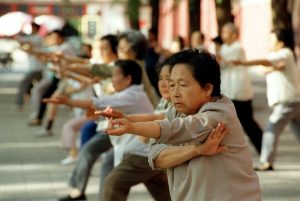Improve Functional Fitness in the Elderly with Knee Osteoarthritis with Tai Chi
By John M. de Castro, Ph.D.
“patients over 65 years of age with knee osteoarthritis (OA) who engage in regular Tai Chi exercise improve physical function and experience less pain.” – Science Daily
Osteoarthritis is a chronic degenerative joint disease that is the most common form of arthritis. It produces pain, swelling, and stiffness of the joints. It is the leading cause of disability in the U.S., with about 43% of arthritis sufferers limited in mobility and about a third having limitations that affect their ability to perform their work. Knee osteoarthritis effects 5% of adults over 25 years of age and 12% of those over 65. It is painful and disabling. Its causes are varied including, hereditary, injury including sports injuries, repetitive stress injuries, infection, or from being overweight.
There are no cures for knee osteoarthritis. Treatments are primarily symptomatic, including weight loss, exercise, braces, pain relievers and anti-inflammatory drugs, corticosteroids, arthroscopic knee surgery, or even knee replacement. Gentle movements of the joints with exercise and physical therapy appear to be helpful in the treatment of knee osteoarthritis. This suggests that alternative and complementary practices that involve gentle knee movements may be useful for treatment.
Mindfulness practices such as Tai Chi and Qigong and yoga have been shown to reduce the physical symptoms of knee osteoarthritis. Tai Chi practice, has been shown to be a safe and effective treatment for a wide variety of physical and psychological conditions, including arthritis. Much of the research involves controlled laboratory studies. It needs to be demonstrated that Tai Chi practice is an effective treatment for knee osteoarthritis of the community-dwelling elderly.
In today’s Research News article “Impacts of tai chi exercise on functional fitness in community-dwelling older adults with mild degenerative knee osteoarthritis: a randomized controlled clinical trial.” (See summary below or view the full text of the study at: https://www.ncbi.nlm.nih.gov/pmc/articles/PMC8325845/ ) Chen and colleagues recruited a sample of community-dwelling otherwise healthy elderly (age >65 years) individuals diagnosed with knee osteoarthritis. They were randomly assigned them to a 60 minutes twice a week for 12 week program of either health education or Sun style Tai Chi practice. They were measured before and after the 12-week practice period for functional fitness including the 30-s chair stand, 30-s arm curl, 2-min step, chair sit-and-reach, back-scratch flexibility, single-leg stand, functional reach, 8-foot up-and-go, and 10-m walk tests.
They found that in comparison to baseline and the health education group, the group that practiced Tai Chi had significant improvements in the 30-s chair stand, 30-s arm curl, 2-min step, chair sit-and-reach, single-leg stand, functional reach, and 8-foot up-and-go. Hence, Tai Chi practice increases functional fitness in the community-dwelling elderly with knee osteoarthritis. This should translate in improved movement with less pain and increased quality of life in these community-dwelling elderly individuals.
So, improve functional fitness in the elderly with knee osteoarthritis with Tai Chi.
“research shows an ancient form of exercise called Tai Chi might offer hope to combat arthritis pain in seniors.” – Julie Podewitz
CMCS – Center for Mindfulness and Contemplative Studies
This and other Contemplative Studies posts are available on Twitter @MindfulResearch
Study Summary
Chen, P. Y., Song, C. Y., Yen, H. Y., Lin, P. C., Chen, S. R., Lu, L. H., Tien, C. L., Wang, X. M., & Lin, C. H. (2021). Impacts of tai chi exercise on functional fitness in community-dwelling older adults with mild degenerative knee osteoarthritis: a randomized controlled clinical trial. BMC geriatrics, 21(1), 449. https://doi.org/10.1186/s12877-021-02390-9
Abstract
Background
Degenerative osteoarthritis (OA) often leads to pain and stiffness of the affected joints, which may affect the physical performance and decrease the quality of life of people with degenerative knee OA. Compared to traditional exercise, tai chi is a safe exercise with slow movements which can facilitate physical functioning and psychological well being, and might be suitable for improving the physical activities of older adults with knee OA. Therefore, this study investigated the impacts of tai chi exercise on the functional fitness of community-dwelling older adults with degenerative knee OA.
Methods
Sixty-eight community-dwelling older adults with knee OA were recruited from the local community to participate in this randomized controlled clinical trial. All subjects were randomly assigned to either an TCE group that practiced tai chi exercise (TCE) (n = 36) or a control group (CON) (n = 32) that received regular health education programs twice per week for 12 weeks. Outcome measurements were determined using functional fitness tests before and after the intervention, including a 30-s chair stand (number of repeats), 30-s arm-curl (number of repeats), 2-min step (number of steps), chair sit-and-reach (reaching distance, cm), back-scratch flexibility (distance between hands, cm), single-leg stand (time, s), functional reach (reaching distance, cm), 8-foot up-and-go (time, s), and 10-m walk tests (time, s). Pre-post comparisons of functional fitness were analyzed using the ANCOVA test with SPSS software version 18.0.
Results
Results revealed that participants’ functional fitness in the TCE group had significantly higher adjusted mean post-tests scores than that in the CON group after the intervention, including the 8-foot up-and-go (s) (mean difference [MD]=-2.92 [-3.93, -1.91], p = 2.39*10− 7), 30-s arm curl (MD = 4.75 (2.76, 6.73), p = 1.11*10− 5), 2-min step (MD = 36.94 [23.53, 50.36], p = 7.08*10− 7), 30-s chair stand (MD = 4.66 [2.97, 6.36], p = 6.96*10− 7), functional-reach (MD = 5.86 [3.52, 8.20], p = 4.72*10− 6), single-leg stand with eyes closed (MD = 3.44 [1.92, 4.97], p = 2.74*10− 5), chair sit-and-reach (MD = 3.93 [1.72, 6.15], p = 0.001), and single-leg stand with eyes opened (MD = 17.07 [6.29, 27.85], p = 0.002), with large effect sizes (η²=0.14 ~ 0.34).
Conclusions
Community-dwelling older adults with knee OA in the TCE group had better functional fitness performances after the 12-week tai chi intervention than those receiving only health education.
https://www.ncbi.nlm.nih.gov/pmc/articles/PMC8325845/
